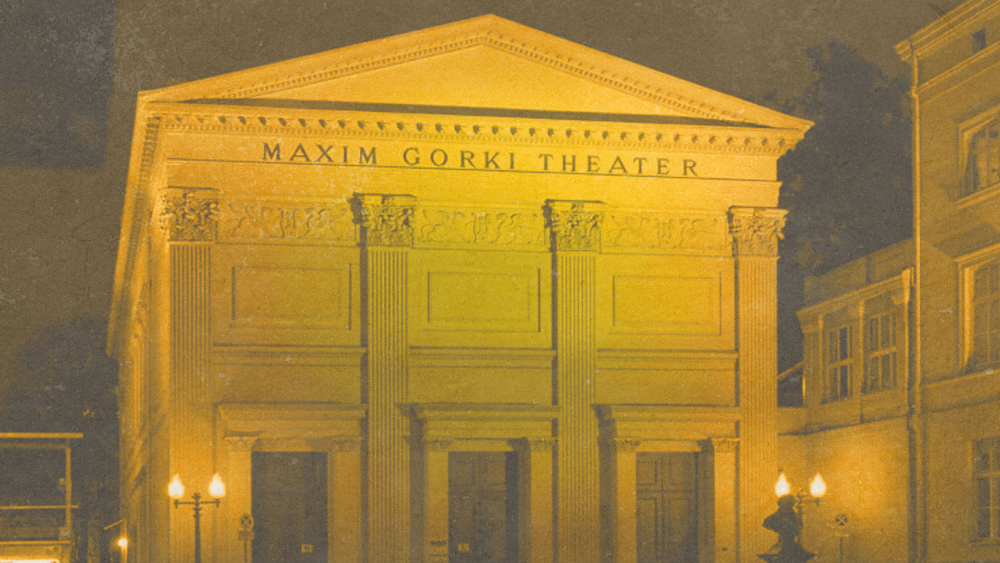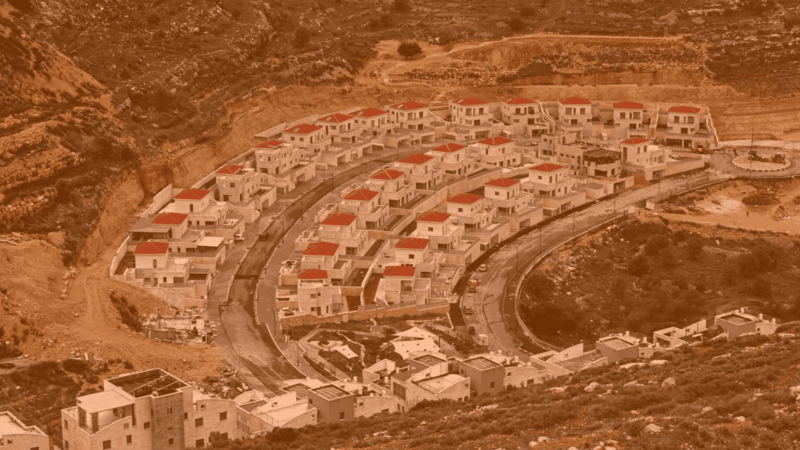Germany’s attempts to silence Palestinian voices will result in nothing but more anti-Semitism, terror and suffering
Earlier this year, we received an invitation from the Maxim Gorki Theatre in Berlin to deliver a lecture about Yugoslavia and participate in a debate on the relevance of the Non-Aligned Movement (NAM) today as part of a programme called ‘Lost – You Go Slavia’.
The theatre, founded in East Berlin in 1952 and named after Soviet writer Maxim Gorki, has long been celebrated across Europe as an inclusive, critical and diverse hub for contemporary theatre. As scholars who have long been researching the NAM and various aspects of Yugoslav socialism and all its accomplishments, failures and contradictions, we were honoured to have been invited to one of Germany’s most respected theatres to talk about a subject we care deeply about.
The NAM emerged as a response to the bipolarisation of the world during the Cold War and included countries that refused to side with either of the world’s two main power blocs at the time. The movement united countries and struggles against imperialism, colonialism, neo-colonialism, racism, occupation and foreign aggression of all kinds. Its founding principles included the doctrines of peaceful co-existence and self-determination.
As we stated in the announcement for the Gorki Theatre event: ”Today, we don’t live in a bipolar world any more, and the world has never been closer to a nuclear catastrophe or a new world war. Thus the question of non-alignment also confronts us with new challenges. The question is not only what we can learn from the Non-Aligned Movement, but what is the relevance of non-alignment today.”
We were very much looking forward to taking part in the event scheduled for the last week of October, but everything changed on October 7.
Hamas staged an attack on civilians in southern Israel, killing about 1,400 people, and kidnapping dozens of others. Israel retaliated with a total siege of the Gaza Strip and a bombardment campaign that saw more than 8,000 civilians killed in a matter of a few weeks.
In response to the Hamas attack, venues and institutions around Germany swiftly started to “cancel” Palestinian speech and advocacy.
The German literary association Litprom, for example, cancelled an award ceremony that was to honour the novel Minor Detail by Palestinian author Adania Shibli at the Frankfurt Book Fair. The decision concerning the book, which focuses on the Nakba and the atrocities committed in historic Palestine during the founding of the state of Israel, caused public outrage. More than 350 authors, including Nobel prize winners Annie Ernaux and Olga Tokarczuk, warned in an open letter that it is the responsibility of the book fair “to create spaces for Palestinian writers to share their thoughts, feelings and reflections”.
Regrettably, the Gorki Theatre has also decided to take action to silence Palestinian voices in response to the Israel-Palestine war. It said it would “postpone” a performance of the Yael Ronen play The Situation that was scheduled for October 23. In its published statement on how it reached this decision, the theatre admitted its powerlessness in the face of the current “situation” but added that “the attack by the terrorist organisation Hamas on Israel puts us on Israel’s side”. The theatre stated that “war is a great simplifier” that “demands a simple division into friend and foe” and concluded that “our arguments with the old wars do not help us with this new one”.
After giving the matter careful consideration, during which we discussed a number of different options, we have decided to withdraw from the Gorki Theatre’s Lost – You Go Slavia programme in protest against its one-sided statement on the cancelling of The Situation.
As scholars and activists who remember the wars of the Yugoslav succession, we reject completely the argument that war is a great simplifier requiring a simple division between friend and enemy. Rightful condemnation of Hamas’s attack on Israel can never be, and should never be, used as a justification for the ongoing actions of the Israeli military in Gaza. The loss of civilian lives on both sides of the conflict is a tragedy. Yet nothing can ever justify war crimes, ethnic cleansing or genocide, as our experience tells us.
We are well aware that, at this time in history, a discussion on the relevance of the Non-Aligned Movement today is needed more than ever. Given the current climate in Germany, where voices speaking up for the Palestinians are increasingly silenced, outlining the NAM’s longstanding and sincere support for the right of self-determination of the Palestinian people and condemnation of Israel’s occupation of Gaza and the West Bank – as our debate at Gorki would have inevitably included – is indeed crucial.
Our withdrawal from the event at the Gorki Theatre is not in any way aimed at withdrawing ourselves from this important and urgent conversation. Instead, it is an effort to point the mirror back at German institutions and communicate to them the shortsightedness of their position on the current situation in Israel-Palestine.
We believe today, of all days, institutions such as the Gorki Theatre should focus their efforts not on silencing Palestinian viewpoints but on bringing people together to discuss history, critique policy and work towards building a world that can hold the whole of humanity equitably together.
Unlike the theatre, we do not believe that “our arguments with the old wars do not help us with this new one”. On the contrary, we believe the brutal collapse of Yugoslavia and the consequent bloody wars that defined much of the 1990s carry many lessons for our current wars. After all, the same international community that failed to act to prevent ethnic cleansing and genocide back then is once again standing idly by as similar atrocities unfold before our eyes in Gaza.
And there is much to be learned from socialist Yugoslavia and NAM’s nuanced stance on Palestine-Israel at a time when the decades-old conflict is at yet another turning point.
Since the Yugoslav national liberation struggle during World War II, in which Jewish people took an active part (10 Jewish people were named national heroes of the resistance, including one of Tito’s closest collaborators, Moša Pijade, who translated Das Kapital into Serbo-Croatian), the position of the Yugoslav leadership – promoted by President Josip Broz Tito himself – was that the Jewish people had the right to their own state. At the beginning of 1953 while on a visit to Great Britain, Tito met the political director of the World Jewish Congress in London, AL Easterman, who expressed his satisfaction with the attitude of the Yugoslav government towards the Jewish people.
At the same time, throughout the entire existence of socialist Yugoslavia, all final summit statements of the NAM ended with support for the people of Palestine and condemnation of Zionism as a form of racism, colonialism and apartheid.
The first NAM summit in Belgrade in 1961 expressed unanimous support “for the full restoration of all the rights of the Arab people of Palestine in conformity with the Charter and resolutions of the United Nations”.
During the Six-Day War in 1967, socialist Yugoslavia severed diplomatic relations with Israel and never formally restored them before its own dissolution in 1991.
In a meeting of NAM foreign ministers in New York in 1977, the ministers saw “the establishment of Israeli settlements in the West Bank and Gaza” as “a clear attempt to prepare for their annexation, and the escalation of Israeli violations and oppressive practices in the area”. The ministers considered these actions to “constitute an obstacle to the endeavours for the achievement of a just and lasting peace in the Middle East”.
In other words, the stance of socialist Yugoslavia and the NAM on Israel-Palestine is a good demonstration of how one can be both against Zionism and for the existence of the state of Israel, while at the same time supporting the people of Palestine in their fight against racism, colonialism and apartheid.
This, obviously, is a point of view that is not much considered or at all welcome in Germany today. When it comes to Israel-Palestine, Germany and, indeed, the rest of the West appear to be suffering from what the Germans themselves aptly brand as “Denkverbot”, which means the prohibition to think.
Our decision to withdraw from the Gorki Theatre event was a modest protest against this current episode of Denkverbot. It was an attempt to put a spotlight on the efforts to cancel Palestine from German public discourse to the detriment of everyone.
We mourn all the innocent victims of this conflict and condemn anti-Semitism in all its forms but caution that the current episode of Denkverbot in Germany and beyond, if not contested urgently, will lead precisely to the opposite of its aims – namely, to more anti-Semitism, more terror and a continued inability to achieve peace in the Middle East.
This article was originally published on Al Jazeera
Do you want to be informed of DiEM25's actions? Sign up here















